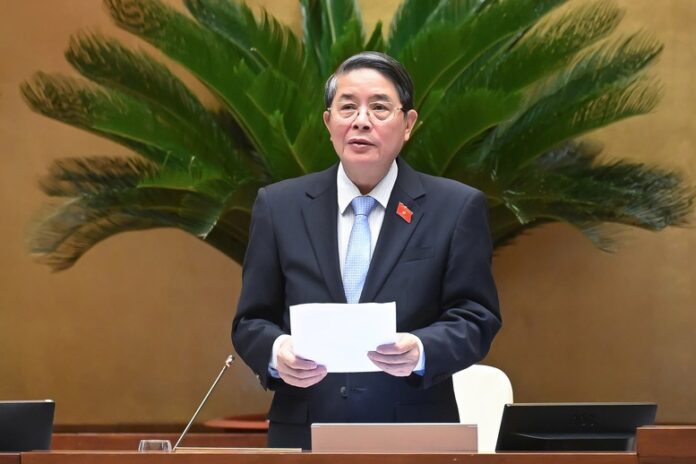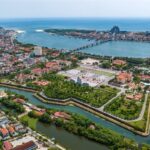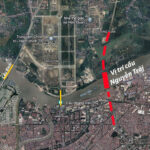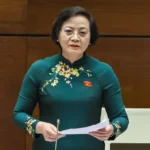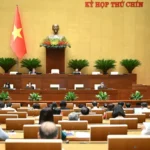During the discussion, delegates affirmed the necessity of issuing a resolution by the National Assembly on piloting several mechanisms and special policies to promote the development of Hai Phong City. This move aims to unblock bottlenecks and create breakthroughs with significant spillover effects in the Red River Delta region, thus contributing substantially to the country’s high growth target for the 2026–2030 period. This proposal aligns with the objectives set by the Politburo in Resolution No. 45-NQ/TW and Conclusion No. 96-KL/TW.
Hai Phong City plays a pivotal role as a strategic growth pole in Northern Vietnam. It serves as a hub for industry, logistics, and the largest seaport in the region, as well as a crucial gateway for international trade. To unleash its full potential and leverage its advantages, Hai Phong City requires an exceptional legal framework that grants the locality greater autonomy in investment, planning, and resource attraction.
One of the most significant bottlenecks hindering development is the challenge in land revocation and site clearance. Delegate Thach Phuoc Binh (Tra Vinh Delegation) pointed out that crucial infrastructure projects, such as belt roads, industrial and high-tech parks, and new urban areas, are facing delays due to land revocation being dependent on the authority that decides on investment policies.
Therefore, Delegate Thach Phuoc Binh proposed that the Chairman of the Hai Phong City People’s Committee be authorized to decide on land revocation for all projects listed in the City Council’s approved catalog, regardless of the level of investment authority, as long as they conform to the approved land use plan and zoning. This measure would shorten the time for investment preparation by at least 6-12 months per project and increase the locality’s proactiveness.
Addressing the issue of reclaiming interspersed land plots in residential areas, Delegate Tran Dinh Gia (Ha Tinh Delegation) drew attention to Clause 7, Article 6 of the draft resolution, which states: “The city is allowed to reclaim small, narrow land plots owned by organizations, households, and individuals that are interspersed with land managed by the state to create a land fund for auctioning land use rights for urban, commercial, and service development purposes according to regulations on land revocation for socio-economic development, national interests, and the public.”
Delegate Tran Dinh Gia argued that the need to resolve interspersed land plots is not unique to Hai Phong City but is prevalent in many other cities as well. Addressing this issue would generate revenue, prevent waste, and ensure urban aesthetics. Emphasizing the importance of this provision, which directly affects the rights and interests of the people, Delegate Tran Dinh Gia suggested defining clear criteria and considering the people’s interests to ensure a balance between individual, collective, and state interests.
Notably, in the context of enhancing regional linkage and improving national competitiveness amid the robust Industry 4.0 revolution, delegates underscored the necessity of recognizing logistics centers as a new business model that plays a pivotal role in connecting industries, localities, and territories.
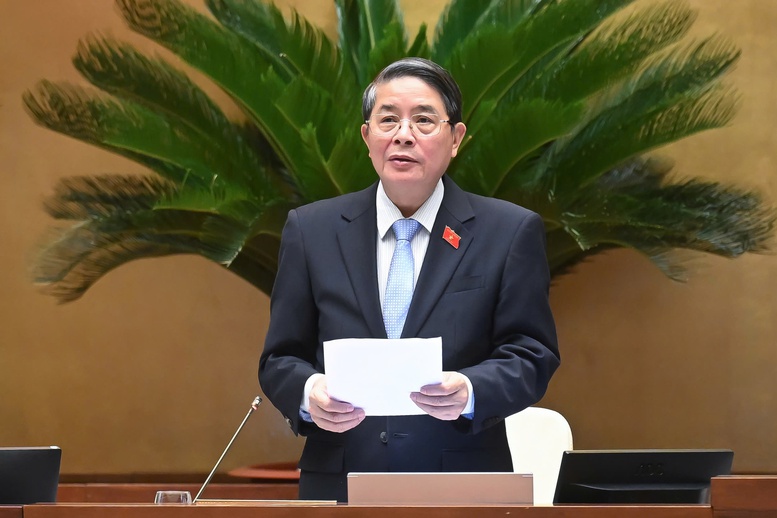
Vice President of the National Assembly, Mr. Nguyen Duc Hai, concludes the discussion.
Delegate Tran Chi Cuong (Da Nang Delegation) emphasized the need for breakthrough policies to develop infrastructure and logistics services in a more systematic and efficient manner. Logistics centers are vital in optimizing the flow of goods, capital, and information, facilitating import-export activities, reducing logistics costs, and enhancing the efficiency and competitiveness of enterprises.
Hence, Delegate Tran Chi Cuong stressed that the proposal to pilot land revocation for the early formation of large-scale, modern logistics centers in Hai Phong City is entirely reasonable and deserves the consideration and support of the National Assembly.
Sharing the same viewpoint, Delegate Sung A Leng (Lao Cai Delegation) affirmed that constructing modern logistics centers with large-scale and high integration capacity is an inevitable trend. Hai Phong boasts a strategic advantage as an international seaport, a multimodal transport hub, and a key import-export gateway in the North, as outlined in the Politburo’s resolutions. It serves as a driving force for regional and national development and plays a leading role in the logistics sector.
Consequently, Delegate Sung A Leng asserted that introducing pilot mechanisms and policies for land revocation to develop logistics centers is both necessary and urgent.
Furthermore, to truly establish Hai Phong as a northern innovation hub, delegates also suggested implementing substantive mechanisms to attract research institutes, high-tech enterprises, international startups, and more.
Concluding the discussion, Vice President of the National Assembly, Mr. Nguyen Duc Hai, stated that through the debate, delegates agreed to issue a resolution of the National Assembly, replacing Resolution No. 35/2021/QH15 dated November 13, 2021. This new resolution aims to further concretize the Party’s guidelines on developing Hai Phong City, offering breakthrough mechanisms in finance and budgeting, land, and other policies to unlock resources. This will ensure Hai Phong’s development aligns with the objectives set by the Politburo in Resolution No. 45-NQ/TW and Conclusion No. 96-KL/TW.
Mr. Nguyen Duc Hai added that the National Assembly Standing Committee will direct the drafting agency, the verifying agency, and relevant agencies to study the opinions expressed in the hall and the discussions in the groups. They will then finalize the draft resolution, seek opinions from the National Assembly Standing Committee, and present it to the National Assembly for consideration and decision.
‘Hike in Maximum Fine is a Big Issue, Full Impact Assessment to be Conducted’
“The proposed increase in maximum fines is a significant matter with direct implications for citizens and businesses alike. According to Justice Minister Nguyen Hai Ninh, it warrants further in-depth study, practical assessment, and comprehensive impact evaluation before any decisions are made.”


























